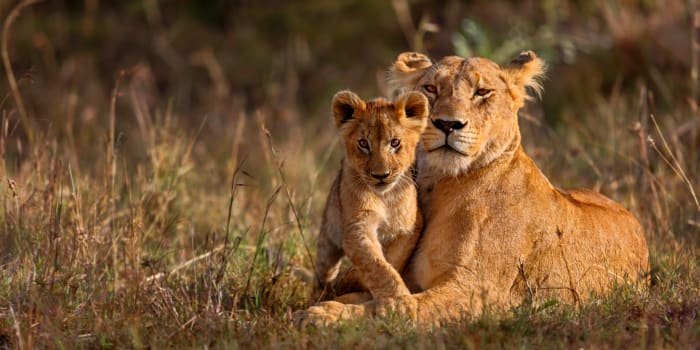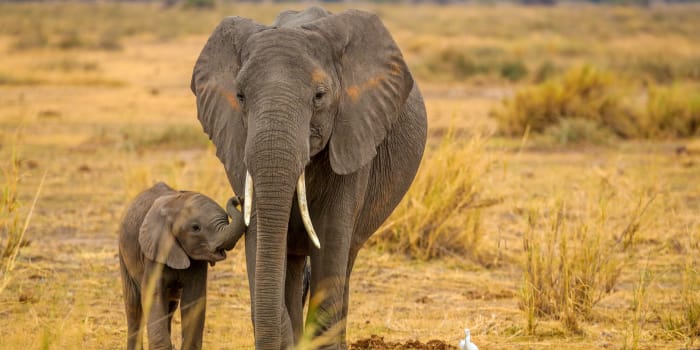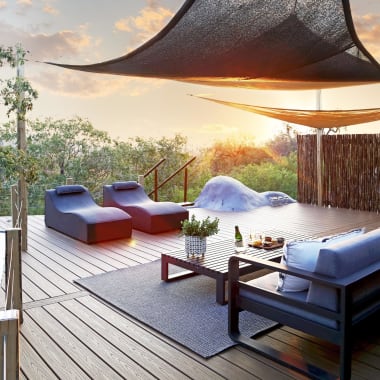
Sarara Camp
Sarara Camp offers nature lovers from all over the world a unique opportunity to authentically experience the pristine wilderness and timeless beauty of Africa. Nestled between juniper bushes and shady forests in the Namunyak Conservation Area in northern Kenya, a group of thatched tents seemingly merges with the dramatic landscape. "Sarara" means "meeting place" in the Samburu language, because this is where the mountains of the Mathews Range meet the vastness of the savannah and provide a habitat for elephants with their family groups, leopards, giraffes, African wild dogs and kudus. It is also home to the Samburu tribe, which plays a key role in the camp and its charitable projects. Sarara Camp is fully committed to sustainability in order to preserve Kenya's cultural and ecological heritage together with the local community. Its remoteness and privacy make this luxury safari camp an intimate retreat in the midst of Africa's boundless natural bounty.
Details
Country
Kenya
Location
Namunyak Wildlife Conservancy
Price
from 930 € per person/ night
Best time to travel
June - October
Rooms
The six elevated tents and the family cottage at Sarara Camp offer unparalleled panoramic views over the mountains of the Mathews Range. All permanent buildings and structures within the camp are constructed from locally sourced stone and timber to minimize the environmental footprint. The walls of each tented suite are largely made of mosquito netting and the spacious interior with carpets and comfortable armchairs opens onto a private veranda. The en-suite bathrooms have an open-air shower whose hot water is sustainably generated by an ingenious, pump-free system and heated using solar power. In the Loimugi house, families can expect two bedrooms, a lounge with dining area and open front as well as a private swimming pool.
Culinary
The dining area, a bar and lounge as well as a rustic veranda are centrally located in Sarara Camp. After tea, coffee or juice are served directly in the tent in the early morning, breakfast can be taken at any time after the first game drive. A buffet lunch is served under the shady trees. If guests wish to spend the whole day in nature, breakfast and lunch can also be arranged as a picnic in the bush. The day continues with a traditional afternoon tea with freshly baked cookies before heading out on another game drive, which ends with a refreshing sundowner in the savannah as the sun slowly sets on the horizon. During dinner on the terrace, you can enjoy the view of the waterhole near the camp. Romantics can also book a private dinner under the stars in the middle of a dry riverbed by the light of a campfire.
Activities
With a bit of luck, you may spot wild animals such as leopards or kudus on game drives in open off-road vehicles. Guided hikes through the bush or the mountains as well as camel or horseback rides also offer an authentic opportunity to get very close to nature. Visiting a Samburu village offers the opportunity to learn more about the tribe's culture. A special highlight during the dry season is a visit to a singing well, a Samburu tradition in which drinking water is pumped up from holes in the ground up to 10 meters deep while traditional songs are sung. Back at camp, you can refresh yourself in the natural rock infinity pool and watch elephants at the waterhole before relaxing on the comfortable loungers in the shade of the trees. Yoga and massage are available on request to relax tired muscles after a long day in the bush.
Location
Sarara Camp is located in the over 340,000-hectare Nanumyak Conservation Area in the southern foothills of the Mathews Range in northern Kenya. The Namunyak Trust Fund makes a valuable contribution to nature conservation and peaceful co-existence between the semi-nomadic Samburu people living here and the wild animals.
Experience this lodge on your Kenya trip
- Safari in the famous Masai Mara
- Adventures with the whole family
- Beach vacation on the Indian Ocean
- Giraffes up close: spend the night at Giraffe Manor in Nairobi
- Cultural encounters with the Samburu people
- Big Five in the Masai Mara












